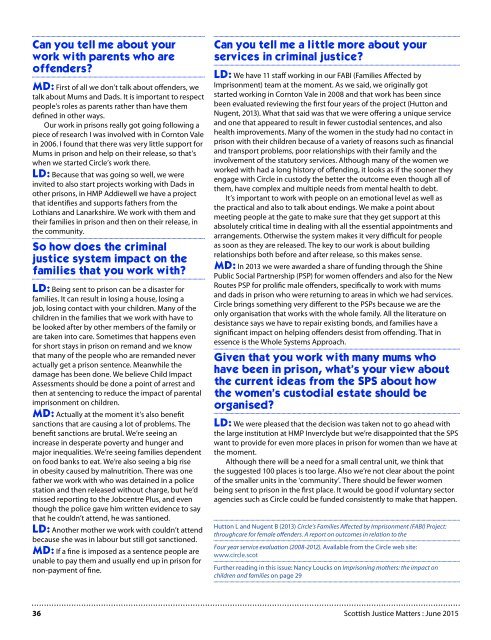Iy9yJ5
Iy9yJ5
Iy9yJ5
You also want an ePaper? Increase the reach of your titles
YUMPU automatically turns print PDFs into web optimized ePapers that Google loves.
Can you tell me about yourwork with parents who areoffenders?MD: First of all we don’t talk about offenders, wetalk about Mums and Dads. It is important to respectpeople’s roles as parents rather than have themdefined in other ways.Our work in prisons really got going following apiece of research I was involved with in Cornton Valein 2006. I found that there was very little support forMums in prison and help on their release, so that’swhen we started Circle’s work there.LD: Because that was going so well, we wereinvited to also start projects working with Dads inother prisons, in HMP Addiewell we have a projectthat identifies and supports fathers from theLothians and Lanarkshire. We work with them andtheir families in prison and then on their release, inthe community.So how does the criminaljustice system impact on thefamilies that you work with?LD: Being sent to prison can be a disaster forfamilies. It can result in losing a house, losing ajob, losing contact with your children. Many of thechildren in the families that we work with have tobe looked after by other members of the family orare taken into care. Sometimes that happens evenfor short stays in prison on remand and we knowthat many of the people who are remanded neveractually get a prison sentence. Meanwhile thedamage has been done. We believe Child ImpactAssessments should be done a point of arrest andthen at sentencing to reduce the impact of parentalimprisonment on children.MD: Actually at the moment it’s also benefitsanctions that are causing a lot of problems. Thebenefit sanctions are brutal. We’re seeing anincrease in desperate poverty and hunger andmajor inequalities. We’re seeing families dependenton food banks to eat. We’re also seeing a big risein obesity caused by malnutrition. There was onefather we work with who was detained in a policestation and then released without charge, but he’dmissed reporting to the Jobcentre Plus, and eventhough the police gave him written evidence to saythat he couldn’t attend, he was santioned.LD: Another mother we work with couldn’t attendbecause she was in labour but still got sanctioned.MD: If a fine is imposed as a sentence people areunable to pay them and usually end up in prison fornon-payment of fine.Can you tell me a little more about yourservices in criminal justice?LD: We have 11 staff working in our FABI (Families Affected byImprisonment) team at the moment. As we said, we originally gotstarted working in Cornton Vale in 2008 and that work has been sincebeen evaluated reviewing the first four years of the project (Hutton andNugent, 2013). What that said was that we were offering a unique serviceand one that appeared to result in fewer custodial sentences, and alsohealth improvements. Many of the women in the study had no contact inprison with their children because of a variety of reasons such as financialand transport problems, poor relationships with their family and theinvolvement of the statutory services. Although many of the women weworked with had a long history of offending, it looks as if the sooner theyengage with Circle in custody the better the outcome even though all ofthem, have complex and multiple needs from mental health to debt.It’s important to work with people on an emotional level as well asthe practical and also to talk about endings. We make a point aboutmeeting people at the gate to make sure that they get support at thisabsolutely critical time in dealing with all the essential appointments andarrangements. Otherwise the system makes it very difficult for peopleas soon as they are released. The key to our work is about buildingrelationships both before and after release, so this makes sense.MD: In 2013 we were awarded a share of funding through the ShinePublic Social Partnership (PSP) for women offenders and also for the NewRoutes PSP for prolific male offenders, specifically to work with mumsand dads in prison who were returning to areas in which we had services.Circle brings something very different to the PSPs because we are theonly organisation that works with the whole family. All the literature ondesistance says we have to repair existing bonds, and families have asignificant impact on helping offenders desist from offending. That inessence is the Whole Systems Approach.Given that you work with many mums whohave been in prison, what’s your view aboutthe current ideas from the SPS about howthe women’s custodial estate should beorganised?LD: We were pleased that the decision was taken not to go ahead withthe large institution at HMP Inverclyde but we’re disappointed that the SPSwant to provide for even more places in prison for women than we have atthe moment.Although there will be a need for a small central unit, we think thatthe suggested 100 places is too large. Also we’re not clear about the pointof the smaller units in the ‘community’. There should be fewer womenbeing sent to prison in the first place. It would be good if voluntary sectoragencies such as Circle could be funded consistently to make that happen.Hutton L and Nugent B (2013) Circle’s Families Affected by Imprisonment (FABI) Project:throughcare for female offenders. A report on outcomes in relation to theFour year service evaluation (2008-2012). Available from the Circle web site:www.circle.scotFurther reading in this issue: Nancy Loucks on Imprisoning mothers: the impact onchildren and families on page 2936 Scottish Justice Matters : June 2015


